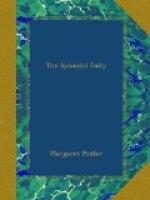Diana wondered what lay behind that curiously controlled expression, and the memory of certain words he had let fall during their journey together suddenly recurred to her with a new significance attached to them. . . . “Just as though we had any too many pleasures in life!” he had said. And again: “Oh, for that! If we could have what we wanted in this world! . . .”
Uttered in his light, half-bantering tones, the bitter flavour of the words had passed her by, but now, as she studied the rather stern set of his features, they returned to her with fresh meaning and she felt that their mocking philosophy was to a certain extent indicative of the man’s attitude towards life.
So absorbed was she in her thoughts that the stir and rustle of the congregation issuing from their seats at the conclusion of the service came upon her in the light of a surprise; she had not realised that the service—in which she had been taking a reprehensible perfunctory part—had drawn to its close, and she almost jumped when Joan nudged her unobtrusively and whispered:—
“Come along. I believe you’re half asleep.”
She shook her head, smiling, and gathering up her gloves and prayer-book, she followed Joan down the aisle and out into the churchyard where people were standing about in little groups, exchanging the time of day with that air of a renewal of interest in worldly topics which synchronises with the end of Lent.
The Rector had not yet appeared, and as Joan was chatting with Mrs. Mowbray, the local doctor’s wife, Diana, who had an intense dislike for Mrs. Mowbray and all her works—there were six of the latter, ranging from a lanky girl of twelve to a fat baby still in the perambulator stage—made her way out of the churchyard and stood waiting by the beautiful old lichgate, which, equally with the thirteenth century window, was a source of pride and satisfaction to the good folk of Crailing.
A big limousine had pulled up beside the footpath, and an immaculate footman was standing by its open door, rug in hand. Diana wondered idly whose car it could be, and it occurred to her that very probably it belonged to the strangers who had attended the service that morning.
A minute later her assumption was confirmed, as the middle-aged lady, followed by the young, pretty one, came quickly through the lichgate and entered the car. The footman hesitated, still holding the door open, and the elder lady leaned forward to say:—
“It’s all right, Baker. Mr. Errington is walking back.”
Errington! So that was his name—that was what the E. on the handkerchief stood for! Diana thought she could hazard a reasonable guess as to why he had elected to walk home. He must have caught sight of her in church, after all, and it was but natural that, after the experience they had passed through together, he should wish to renew his acquaintance with her. When two people have been as near to death in company as they had been, it can hardly be expected that they will regard each other in the light of total strangers should they chance to meet again.




